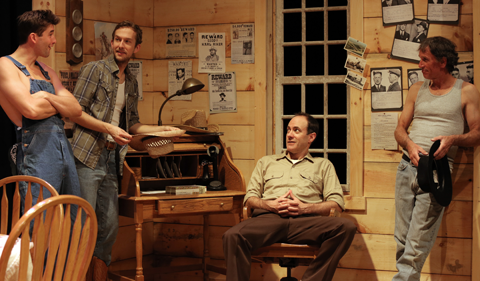
BODY TALKS A silent exchange between Lizzy (Laurel Casillo) and Starbuck (Max Waszak). |
While it hasn’t rained on the Curry family’s 1920’s-era ranch in far too long, the drought is more than literal in The Rainmaker, N. Richard Nash’s oft-revived comedic drama. The love drought of late-twentysomething Lizzy Curry (Laurel Casillo) has lasted so long that her father and brothers believe it might be permanent, and it takes a drifter with a weather-conjuring con to precipitate things. Brian P. Allen directs at Good Theater, in a production that features a terrific leading “spinster.”
Despite her youth, smarts, sass, and kindness, Lizzy is considered an old maid by her conventionally-minded father H.C. Curry (Michael Kimball) and two brothers, the priggish, self-righteous Noah (Graham Emmons), and looser, pleasure-seeking Jim (Conor Riordan Martin). They’ve sent her off to distant cousins to find a man, then tried to set her up with the crabby deputy sheriff File (Christopher Holt), all to no matrimonial avail: Lizzy is too smart and too little of a flirt to appeal to conventional tastes. Meanwhile, charismatic stranger Starbuck (Max Waszak) promises to bring the ranch rain for a mere $100. He also chides Lizzy for not letting herself be “a woman,” and then helps her let herself.
A woman’s self-realization via a mysterious male catalyst is not exactly a fresh conceit, and Nash’s 1954 script is sometimes a little creaky, a quality that’s exacerbated by somewhat theatrical delivery by the Curry men in the early scenes. But their characters become looser and more engrossing as the plot develops, and the proceedings are always well-paced and lively—as bright as the plain pine boards of the set, which includes the Curry kitchen, a tack house (filled with impressively real saddles and tack), and File’s wanted-poster-papered office (Stephen Underwood’s set design). Upstage, a rough wooden fence is backlit by colors of sunrise and sunset, while withered corn stalks curl against it like a line of lovelorn script.

RANCH DRESSING The men of The Rainmaker in a scene of repose. |
Men are at the center of this landscape and culture, and Lizzy’s brothers take up a lot of psychic space in the house she tends. Emmons’s Noah, skinny and unfailingly unpleasant, his jaw set in resentment, plays a good foil against Martin’s fleshier, sensual Jim, who is quick to grin and rather pointedly bare-chested under overalls. Kimball does particularly fine, quiet work once he loosens H.C. up and gives him a detached, deadpan amusement with which to take in Starbuck’s con. As Starbuck, Waszak has a sort of cipher charisma that could go bigger in the beginning; he later draws Starbuck more poignantly as the rainmaker reveals his own imagination-riddled pathos. And as his inevitable—and more culturally sanctioned—rival, an understated Holt wisely keeps File’s angst and stock lines contained in the strained chewing of his jaw.
But this show really belongs to Casillo, a guest artist from New York. She has a dazzling alacrity, a sharp intelligence, and quicksilver response in her frame, muscles, and face—it’s a delight to watch her giddiness, irritation, or rage speed over the length of her nerves and manifest as gestures and movement. She is both funny and ferocious in her acknowledgement of her place as an uncommon woman among so many conventional ones, especially as she playacts at flirtatiousness—she caps her shtick with a fierce, fleet glare. She also brings her performance down affectingly when Lizzy is faced with her supposed pathos—when File doesn’t come to dinner, when Noah has said unfeeling things about her plainness.